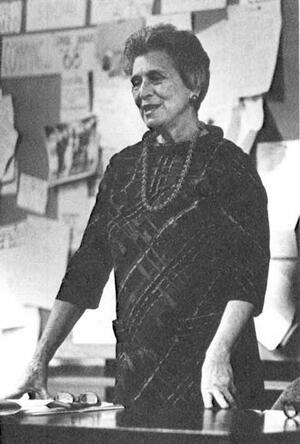Pearl Willen
Pearl Willen’s term as president of the National Council of Jewish Women from 1963 to 1967 capped a long career of community organizing from the local to the international level. After earning an MA from Columbia in 1935, Willen helped organize the Southern School for Workers, which promoted literacy among union workers, and chaired the Southern Camp of Pioneer Youth, a camp for workers’ children. She became deeply involved in the American Liberal Party as chair of its women’s division and vice chair of its State Administrative Committee, and she ran for City Council in 1943. In 1951 she visited West Germany to study organizational life there for the State Department. She also served on numerous prestigious boards, including Hebrew University in Jerusalem and the American Red Cross.
Pearl Willen was a social and human welfare activist and communal leader with a love for Jewish heritage. She had a lifelong record of service for such causes as civil rights, women’s rights, and the rights of workers.
Education and Activism
Born in Chicago, Illinois, on January 2, 1904, Pearl (Larner) Willen was the daughter of Sarah and Mayer Larner, the oldest of four brothers and one sister. She graduated from Washington University and came to New York on a fellowship at the Graduate School of Jewish Social Work. It was there, in 1925, that she met and married Joseph Willen. Her husband, who died in 1985, was the executive vice president of the Federation of Jewish Philanthropies, and they had two children, Paul Willen, an architect, and Deborah Meier, an educator. Willen received an M.A. degree from Columbia University in 1935. She began her career as a case worker in child care at the Foster Home Bureau in New York in 1927 and was a field organizer and group leader for the Parent Education Council in Westchester, New York. Involved in many social programs, she helped organize the Southern School for Workers (a resident workers’ school), which emphasized the principles of unionism. Here she taught and encouraged workers to read and write.
A dynamic and dedicated leader in political as well as communal settings, Pearl Willen was chair of the Women’s Division of the American Liberal Party, which backed the trade unions and introduced liberal idealism in New York politics. She was involved in many organizations including the Southern Camp of Pioneer Youth, an organization supporting two camps for children of trade unionists, where she served as chair. She served as secretary to the Labor Education Service, a national organization in the field of workers’ education, as a member of the Executive Board Union for Democratic Action, as a member of the Board of Editors of the Jewish Welfare Board Women’s Division Journal, and as vice chair of the State Administrative Committee of the Liberal Party. She ran for the City Council of New York in 1943, stating that “democracy means wide participation by all people, especially in New York, where we have to break down its bigness into units that reach everybody.”
International Legacy
Willen was appointed in 1951 by the State Department to participate in a panel of American women to visit and study organizational life in West Germany. She was on the board of governors for the Hebrew University in Jerusalem and on the board of directors of the American Friends of the Hebrew University, as well as on the board of governors for the American Red Cross. She led the International Council of Jewish Women for three years and traveled throughout Europe, Asia, and South America to help Jewish women develop their leadership skills. She led many programs dealing with human rights and social welfare in the National Council of Jewish Women, and, because of her outstanding service, was chosen as its president from 1963 to 1967.
Her children remember her as an articulate and dedicated leader who fought for the underdog, as well as a humorous and warm mother and grandmother. She lived life to its fullest and was not only a leader in liberal social causes but also an inspirational speaker, a talented pianist, gardener, and athlete.
Pearl Willen met an untimely death at age sixty-four in March 1968, while on an African safari, when the vehicle she was in overturned. Willen had a lifelong record of service and worked to advance human welfare and democracy. A great humanitarian, she actively worked for freedom from oppression and poverty for all people.
AJYB, 70:526.
American Examiner (July 7, 1966): 10.
EJ s.v. “Willen, Joseph”.
Levine, Sue. Interviews with Paul Willen [son] and Deborah Willen Meier [daughter].
Obituary. NYTimes, March 18, 1968, 45:1.
Willen, Pearl. Biographical sketch.
WWWIA, 5.



